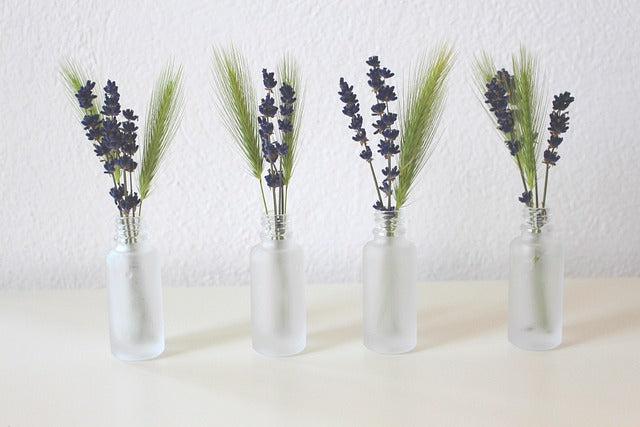
The Power of Lavender Essential Oil: Uses for more natural living
Share
If there’s one bottle that earns a permanent spot on my shelf, it’s lavender essential oil. It’s the kind of remedy that is perfect for natural lifestyle choices, it is gentle, simple, and versatile. Whether you’re calming a restless mind after a long day or treating a scraped knee from the garden, lavender can do the job.
Let’s take a look at some of the many reasons this fragrant oil deserves a place in your natural medicine cabinet.
A Flower with a Purpose
Lavender (Lavandula angustifolia) has been used for centuries for its healing and calming properties. Those fragrant purple blooms are more than just pretty, they hold within them a powerful oil that soothes, heals, and freshens with ease.
Modern research supports what traditional herbalists have known always: lavender oil is rich in beneficial compounds like linalool and linalyl acetate, which give it calming, antimicrobial, and anti-inflammatory effects.¹
1. Natural Stress Relief - One Drop at a Time
Living close to the rhythms of nature is peaceful but not always restful. Between tending the garden, caring for a family, or just keeping life in balance, it’s easy to feel worn thin.
A drop or two of lavender essential oil can work wonders for calming frazzled nerves. Try it in a diffuser, a warm bath, or rubbed (diluted) onto your temples or wrists. Lavender has been shown in clinical studies to reduce anxiety and support relaxation, especially when inhaled.² ³
Natural Living Tip: Add a few drops to your pillow at night or whip up a simple linen spray to support deep, restful sleep.
2. Skin Soother & First Aid Staple
Lavender oil is a great choice for first aid, with its anti-inflammatory and antimicrobial properties making it perfect for soothing minor burns, cuts, scrapes, insect bites, and even blemishes.⁴
Natural Living Tip: Make a healing balm with equal parts beeswax, coconut oil, melt over a pan of hot water and a few drops of lavender, pop in the freezer to set and then keep on hand (once set it can be stored at room temperature) for minor scrapes and stings.
Studies show lavender can promote healing and reduce pain and redness when used topically (always diluted,of course).⁵
Lavender can make your home smell amazing, put a couple of drops into hot water for cleaning. Add it to vinegar sprays, place a few drops on a cotton wool ball, or pop into simmer granules over a candle. The fresh, herbaceous scent purifies the air and creates a calm, cozy atmosphere.
Natural Living Tip: Mix lavender with lemon or eucalyptus essential oil for an extra-bright, naturally clean aroma around the home.
Research supports its mood-lifting, antimicrobial qualities even in diffused form.⁶ Plus it totally lifts your mood.
4. Pest Protection
Believe it or not, many pests aren’t fans of lavender. Moths, mosquitoes, mice, and fleas will often steer clear of its scent, making it a safe, natural way to deter them.
Natural Living Tip: Tuck dried lavender sachets in drawers or closets, or place a cotton ball with a few drops of oil in pantry corners and near entry points.
Studies have shown lavender oil to be effective in repelling certain insects, especially mosquitoes.⁷ It's not a replacement for heavy-duty repellents in high-risk areas, but for everyday natural living it’s a gentle and fragrant option.
A True Natural Living Companion
Lavender essential oil is more than just a pleasant smell. It’s like a message from our ancestors, from a time before modern medicine, when only plants were available to heal, passed down from nature and embraced by generations of folks who relied (and still do) on plant-based solutions. In a world where “natural” often feels rare, lavender reminds us that the best remedies are often the ones that grow right at our feet.
So next time you’re winding down from a long day or looking for a remedy that works in harmony with your values, reach for that calming bottle. You might be surprised how many ways it can lend a hand.
🌿 References:
- Cavanagh, H.M.A., & Wilkinson, J.M. (2002). Biological activities of lavender essential oil. Phytotherapy Research, 16(4), 301–308.
- Kritsidima, M., Newton, T., & Asimakopoulou, K. (2010). The effects of lavender scent on dental patient anxiety levels: A cluster randomized-controlled trial. Community Dentistry and Oral Epidemiology, 38(1), 83–87.
- Koulivand, P.H., Ghadiri, M.K., & Gorji, A. (2013). Lavender and the nervous system. Evidence-Based Complementary and Alternative Medicine, 2013, 681304.
- Hancianu, M. et al. (2013). Neuroprotective effects of inhaled lavender oil on scopolamine-induced dementia via antioxidant activity in rats. Phytomedicine, 20(6), 557–565.
- Da Silva, G.L. et al. (2015). Wound healing effect of essential oil of Lavandula angustifolia in rats. Phytotherapy Research, 29(8), 1231–1237.
- Sayorwan, W. et al. (2012). The effects of lavender oil inhalation on emotional states, autonomic nervous system, and brain electrical activity. Journal of the Medical Association of Thailand, 95(4), 598–606.
- Nerio, L.S., Olivero-Verbel, J., & Stashenko, E. (2010). Repellent activity of essential oils: A review. Bioresource Technology, 101(1), 372–378.
